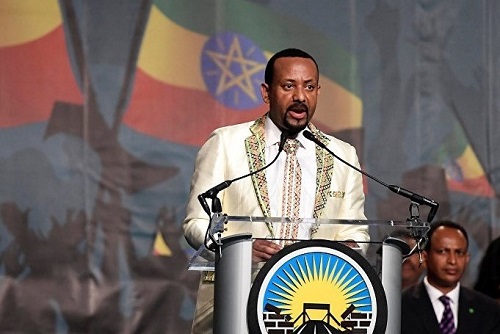Reuters photo
Alem Hailu G/Kristos
Thoroughly assessing the past to mend shortfalls such as dissensions and seeing to the furtherance of glaring achievements like double digit economic growth in a row are the magic bullets that render Ethiopia’s future rosy.
Introspection aiming at rejuvenation is decisive to bring forth growth from within. Slamming the past indiscriminate as if it did not lay the groundwork for today does not work.
It was alluding to the expression “When an egg is broken from within, life flourishes, but death takes place when the breaking occurs by an external force,” Prime Minister Dr. Abiy Ahmed putting the current posture of the leading party and the political scenario in Ethiopia at the 11th Conference of the Ethiopian People’s Revolutionary Democratic Front (EPRDF) held in Hawassa.
The metaphoric expression is meant to ram home after an overhauling work, emerging from the doldrums-like situation it experienced, EPRDF, now, is in full gear and ever alert to walk the country through the avenue of tranquility, justice, democracy and development.
Putting things that were sources of squabbles behind their back, state partner parties and congress participants have expressed conviction to work better than their best regarding engaging in activities that render citizens beneficiaries, putting in place policies that are in consonance with the heartbeat of citizens, redressing mistakes, setting examples of servant-leaders and laying a springboard for a democratic culture. They have also vowed to see to sustainable development, everlasting peace, reinforcing love and forgiveness, shunning antipathy, learning quickly from past mistakes and preferring selflessness to self-seeking bent.
Amplifying Ethiopianism within the framework of unity in diversity, which recognizes the right and identity of each ethnic group, is one of the objectives participants put atop their agenda to go for in a concerted fashion down the road. Participants have reached a consensus that the orientation as well as the process should be in this fashion.
The conference wrapped up last Friday passing resolutions which induces the change drive that bought credence among citizens.
Ensuring tranquility and crystallizing enduring peace through the respect of rule of law and order will top the salient tasks of the ruling party, which underwent reform and injected a new blood. Towards this end bringing into life institutions that irrigate the country’s peace and furnishing the institutions with modern facilities and skilled manpower will be pursued inexorably by the government.
When it comes to the heinous and displeased that disturb peace expectant of forgiveness on grounds of their past good deeds, henceforth they will have no room to go scot free.
Citizens’ right to voice or write their beliefs, true to freedom of expression, will enjoy added support from the government’s side to reinforce the democratization process. To guarantee the political terrain will no longer be lopsided, the electoral board will be reshaped so that it keeps abreast with modern trends and exercises its tasks independently. The human rights commission will undergo the same process.
Only those parties whose political agenda buys the majority’s credence could come to power. This way the country will develop the culture of democracy like admitting defeat, congratulating the winner and preparing for the next election as witnessed in developed countries. In paving the way towards the burgeoning of a robust democracy, oppositions will be allowed their due role.
Towards the betterment of the life of citizens, with a special focus on the youth and women, the government will press ahead with creating more job opportunities.
The country’s age-old culture of maintaining tranquility and quiet, sharing and lending helping hands during rainy and good days, has to be allowed to continue. Pertaining to this the role of religious leaders, elders, elites, parents and civic organizations is indispensable.
By no means the change drive should suffer a setback is what citizens are stressing as reflected in the 11th EPRDF conference.
Alem Hailu G/Kristos
A published poet, novelist, editor, translator of masterpieces, literary critic, playwright and journalist from Ethiopia. M.A holder in literature, Addis Ababa University.
Looking for a traditional publisher of a collection of poems. My novel: ‘Hope from the debris of hopelessness’.



No Comments Yet!
You can be first to comment this post!